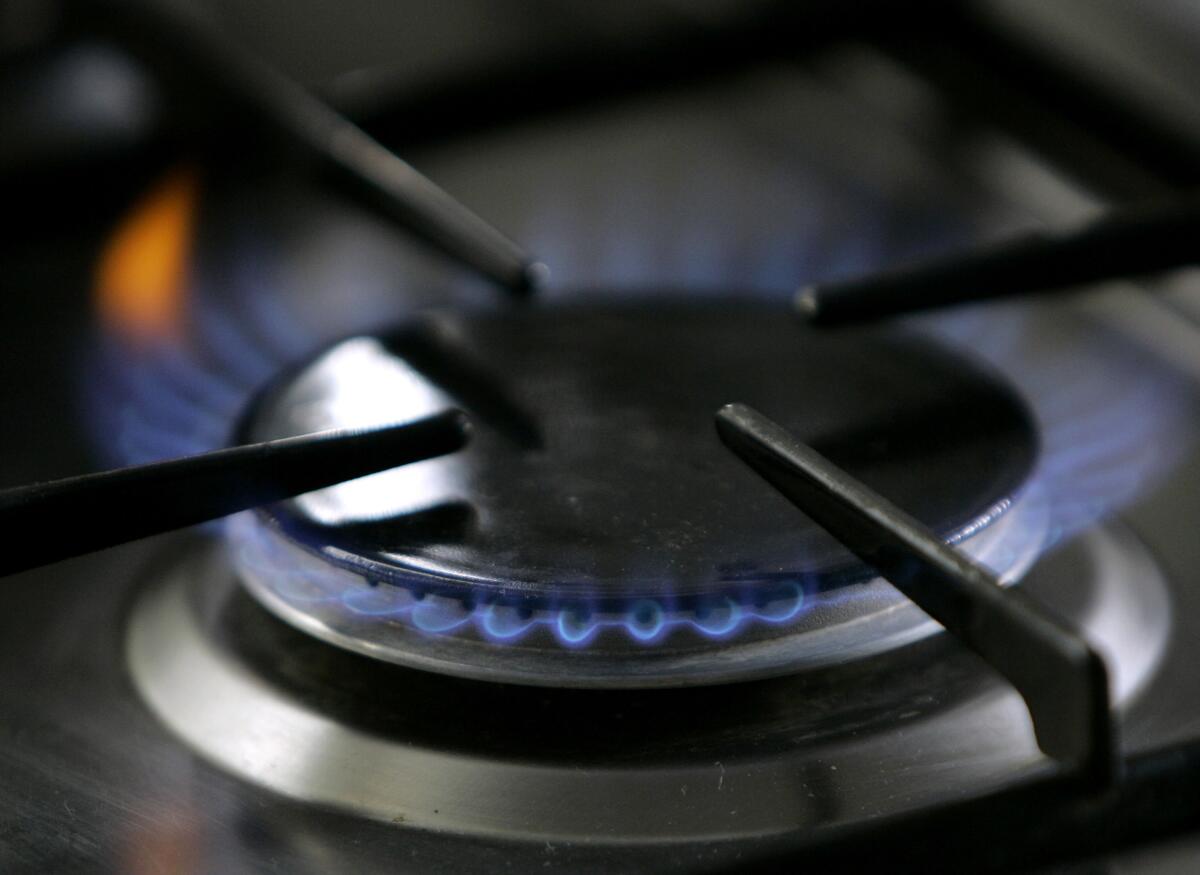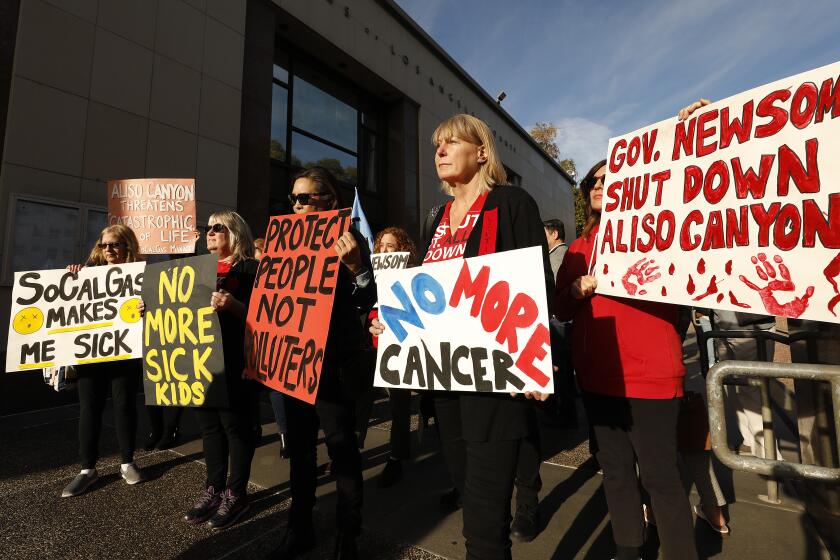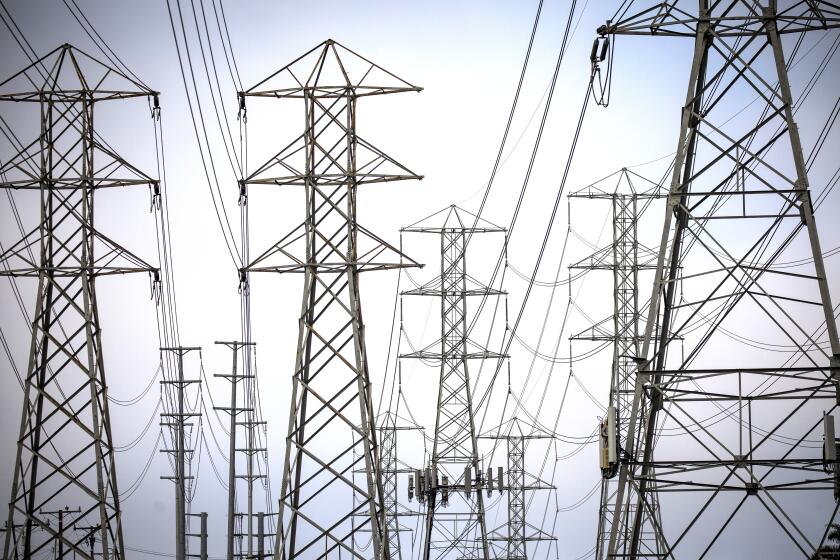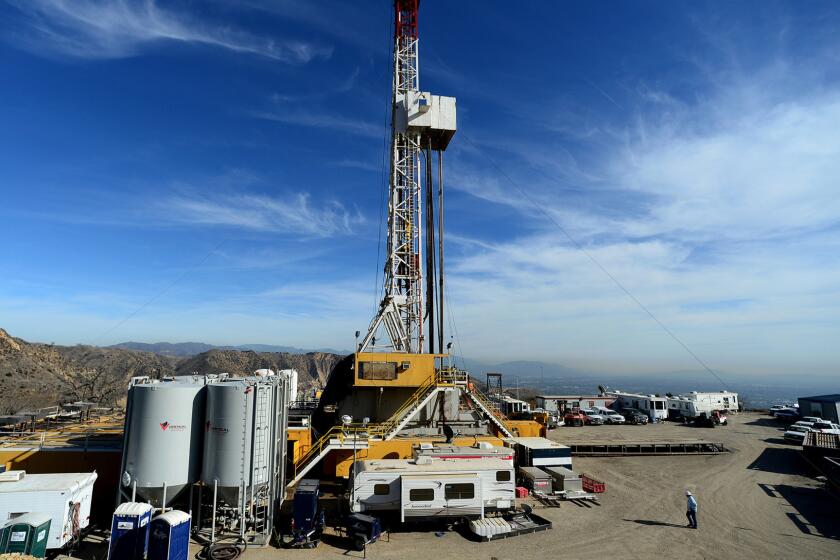Polluters keep trying to block gas bans. California cities shouldn’t be deterred

- Share via
Buildings are one of the largest sources of climate pollution in California because most of the stoves, water heaters and furnaces in homes and businesses still run on natural gas that fouls the air and heats the planet.
To slow the climate crisis and reduce smog, we need action at all levels of government to quickly replace fossil-fueled heating and cooking appliances with electric models powered by clean, renewable energy. A growing number of California cities and counties have wisely decided to stop expanding fossil fuel infrastructure by enacting policies to ban or discourage gas hookups in new construction or move to all-electric building codes.
But a recent federal appeals court decision could throw a wrench in some of their plans. A three-judge panel of the U.S. 9th Circuit Court of Appeals ruled in favor of the California Restaurant Assn., which filed suit in 2019 against the city of Berkeley’s first-in-the-nation ban on natural gas piping in new buildings, reversing a district court that dismissed the case.
The panel of two Trump-appointed judges and one Reagan appointee held that Berkeley’s gas ban is preempted by the federal Energy Policy and Conservation Act. The 47-year-old law was enacted in the wake of the 1970s oil shocks and authorized the U.S. Department of Energy to establish energy efficiency standards for appliances such as air conditioners, furnaces, refrigerators and water heaters. The law prohibits state and local governments from setting their own appliance energy standards.
It’s a pretty radical view that an energy efficiency law should actually prevent local officials from taking action to phase out gas infrastructure and appliances in favor of more efficient technology such as heat pumps and induction stoves. The ruling is almost certain to have a chilling effect on other cities and counties considering similar bans on new gas hookups. That’s exactly what fossil fuel interests and their allies want.
Editorial: SoCalGas used customers’ money for pro-fossil-fuel advocacy, again. That’s shameful
A proposed $9.8-million fine against Southern California Gas Co. is unlikely to deter it from using ratepayer money to derail climate change action.
Berkeley Councilmember Kate Harrison, who wrote the 2019 ordinance, wants the city attorney’s office to request a re-hearing of the case by the full appeals court. She said that the legal challenge was really about “the dangerous idea that business profits trump local and state government’s right to protect our community’s health and safety and a habitable climate.” She said she’s heard few complaints from residents and businesses since the ban took effect, and builders tell her it’s less expensive to build with all-electric infrastructure.
More than 70 other cities and counties, including Los Angeles and San Francisco, have since adopted similar measures to ban or discourage gas hookups in new construction or move to all-electric building codes. And though it’s still early to say, the Building Decarbonization Coalition believes that, based on the way they were drafted, 26 local ordinances will probably be impacted by the decision.
The ruling has also renewed questions about the behavior of Southern California Gas Co., the nation’s largest natural gas utility and a subsidiary of Sempra Energy that has a history of pushing against state and local electrification efforts. Environmentalists and consumer advocates suspect the utility is working behind the scenes to support the legal challenge to Berkeley’s gas ban, though the utility has denied involvement in the case and the restaurant association says it has not coordinated with SoCalGas on the litigation.
California is moving to an income-based formula for electric bills. Regulators should proceed cautiously and not give the utilities the high fees they want.
But advocacy groups point to the long-standing connections between the utility and the restaurant group, including more than $2 million in contributions SoCalGas has made to the California Restaurant Assn. and its foundation since 2019. The utility said those donations were for a resiliency fund launched during the pandemic to help restaurants with equipment and payroll costs. The gas company has also used Reichman Jorgensen, the same law firm representing the restaurant association in the lawsuit against Berkeley. The utility tried to include more than $1 million of its legal expenses for the firm in its application for a 20% rate increase on customers. (Only after being ordered by a judge to answer questions about the expenses did the company say they were “unintentionally categorized” as ratepayer costs.)
In an interview Friday, SoCalGas President Maryam Brown said the utility retained the law firm to advise it on environmental matters, on liability matters and “on different aspects of these local, state and federal restrictions on natural gas.”
She said the firm’s work was unrelated to the Berkeley litigation and insisted that “no ratepayer funds have been used or will be used to support that law firm’s work for us.”
An independent watchdog within the California Public Utilities Commission has accused the Southern California Gas of using ratepayer dollars to create a front group to lobby against policies designed to reduce greenhouse gases from homes and buildings — and then lying about it.
She said that though the utility is against bans on natural gas infrastructure, it has not been publicly opposing them. “We have never opposed any local ordinance related to limitation on the use of gas,” she said.
Californians have good reason to be skeptical of SoCalGas’ motivations, given its record. In addition to being responsible for the largest methane leak in U.S. history, the utility has a shameful record of seeking to derail climate action. It has repeatedly been caught using customer money for pro-fossil fuel advocacy. It has set up fake community groups and secretly funded other efforts to oppose the replacement of polluting natural gas infrastructure with zero-emission electric alternatives, among other questionable tactics.
It’s obvious the gas company realizes that it’s not a credible voice on climate and energy, so it tries to launder its message through surrogates and astroturfing.
While the appeals court decision is a setback for now, it doesn’t prevent officials across the state from using a variety of other tools, including emissions standards and more stringent energy codes, to achieve the same outcome: the end of new gas appliances and infrastructure that are incompatible with California’s goals for clean air and a livable planet.
More to Read
A cure for the common opinion
Get thought-provoking perspectives with our weekly newsletter.
You may occasionally receive promotional content from the Los Angeles Times.












